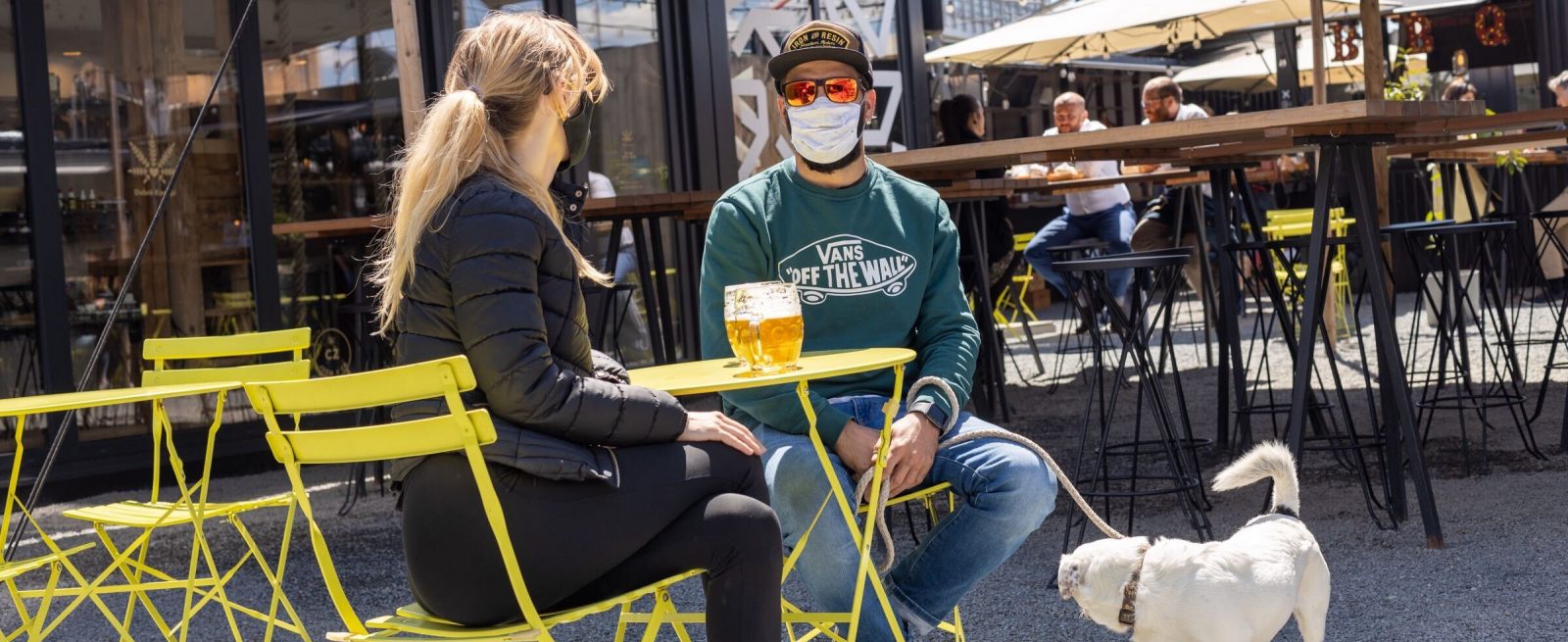Return to Revenue: Manifesto Market Realizes Record Income After Reopening
6 Min Read By Martin Barry
Manifesto Market A/B tested two responses to the coronavirus crisis and generates record income after the reopening.
We are two weeks into the first phase of post-covid reopening in Prague, which began with outdoor restaurants on May 11, followed by indoor spaces this week. From the moment Manifesto was able to offer on-premise experiences again, the sales beat same day YOY sales figures seen in 2019. How is that possible? Let’s rewind, and take a closer look.
We were not given a handbook for this situation. When you're told your core business, everything you've built, has to close for an indefinite period of time, for some people it's devastating. There are businesses committed to their mission for 20-30 years, chefs, restaurant owners. And young firms like Manifesto Market, two years on the market. Overnight, every and each of those faced the same existential question: what is the right reaction to this crisis, knowing there's no middle path nor option to correct a wrong decision. I know what I didn't react with: pity. There was no time for pity. We had to spring to action, immediately. Unlike most businesses, we had the possibility to address it with two different solutions, as we have two locations in Prague. As anti-epidemic measures began relaxing, we were finally able to welcome our customers back. What's the conclusion of our A/B testing, after the peak of the crisis has passed?
We were not given a handbook for this situation. When you're told your core business, everything you've built, has to close for an indefinite period of time, for some people it's devastating.
Manifesto Market, created in 2018 as a vibrant and stylish place designed to bring people together around high-quality gastronomy. We built a strong, emotionally resonant brand for it which attracted a dedicated customer base. Manifesto was at the bullseye of the crisis as the Czech Republic employed some of the most severe measures in Europe. Right in the middle of our international expansion deals and a founding round, I found myself rolling my sleeves and building survival plans. Not only for us, but for four dozen independent vendors under our umbrella. I knew my decision would affect all of them. I knew we had to survive, we had to innovate and we had to thrive.
This is A: Manifesto Florenc. In this location, I have fast-tracked alternative solutions to keep operating within the rules of the government, keep our tenants in business and help them generate some income as a ghost kitchen offering a one-of-its-kind bundled delivery and takeaway. My main focus was solidarity with our independent tenants, allowing them to generate revenue and save jobs, while keeping everyone safe.
Our B solution was Manifesto Smichov. This market closed completely when the lockdown was announced. This was also the most frequent business advice I was given – layoff staff, and wait until normal operations would be allowed again.
If you look at this as an A/B test for financial metrics – closing versus limited bundled delivery-only, you can draw some conclusions. Option B (closing completely) saves money, but it’s not a clear win. You don’t generate any revenue, but you still have to pay recurring invoices like energies, rent, security, garbage contracts, data contracts and things like this. We couldn’t just turn it off and wait for our suppliers to turn off their invoices. That's not how it works. You have a lot of costs, even when you close something, but no revenue.
From a purely financial standpoint, we might have lost less in Manifesto Smichov by closing, but we still lost money. However, we also lost the staff and cash flow. We put our tenants at risk. Closing was not the greatest decision, but we learned something. There was a risk that the operating costs were too high and our tenants couldn't afford being in such a limited business. It was a strategic decision.
Whereas our A solution was a clear commitment to our tenants – the independent businesses who are our lifeblood. Our principle is that we have to treat them as we’d like to be treated. We had to renegotiate over 30 leases in a single day. We recognized that the situation they're going through is probably heavier than what we're going through and if they all crash, we burn. Solidarity was important but we didn't stop there.
If you look at it from a more qualitative perspective, what do you gain when you close something? Nothing. Maybe less headaches, but you also have to lay off already-trained staff and you potentially lose tenants and clients. The stress probably outweighs the benefits of doing that, and draws out future stress on the business. It's not so easy to say A or B worked, but what we learned is that a is that A was more beneficial long-term.
The case of keeping Manifesto Florenc open was great because we were able to test a new business model – bundled delivery – that kept our tenants in business, generating some income. We saved tens to hundreds of jobs, in that case. That to me is valuable.

During the advent of COVID, we saw the competitive environment on delivery platforms. Many of our tenants have other spaces in the city, other restaurants. They were then out of their main source of business, competing on these platforms like Uber Eats, Wolt and other local providers, with every other restaurant that needed to sell completely online. So, a small restaurant selling Mexican food goes up against 100 other Mexican restaurants, and worse – against 500 more burger places, trying to sell their burger against everybody else with virtually no marketing support. They don't have a whole lot of cash to make special offers.
We thought forward. We know that tech-enabled off-premises and in-market experiences will always create complementary legs in our business plan ever after.
Manifesto decided to fast-track a project already in the works – bundled delivery. What's different? We were able to take the customer experience that people love – coming to Manifesto and having the choice of 20 different restaurants at their fingertips – and keep it accessible by offering those same exact choices online. Manifesto delivery is not something we launched because of COVID, but only accelerated. Representing a whole bunch of independent restaurants, we were in a better position to negotiate reasonable commission with 3rd party platforms. Moreover, we melted it in our already softened rental fees of our tenants.
Our thesis for an innovative delivery is that the customer wants this experience: the opportunity to order from multiple restaurants with one swipe, one purchase, one courier. And we were fast because we were already ready with the blueprint of what that service would look like behind the scenes. During the crisis we proved that if a customer orders more than one dish, 68 percent of the time they're likely to order from two restaurants. If they are a family of three, 78 percent of the time they will be ordering from three different restaurants. The more dishes people order, the more likely they are going to split their orders across multiple restaurants.
The bundled delivery platform became our core business, shifting the entire company to focus on how we cobble together the technology and logistics to get bundle orders from 15 restaurants out the door on time. We succeeded and tested the model cheaply. We saw sales growth of almost 30 percent every day for the first three weeks, to the point where we were told that we're one of the biggest sellers on our partner's delivery platform in the Czech Republic.
Even if on a unit basis, we lost money in both situations, our tenants were able to survive, we were able to help push them over the summit, save jobs and therefore get back on track much sooner then we might have otherwise. We were able to test, launch and prove a new viable off-premises model and we know that this needs to be a bigger part of the business. We came out with data and a user case to perfect our model and fundraise for it. We are optimistic about the future. It's far more affordable for a restaurant or entrepreneur to open a space at Manifesto. In most cases it's done with 10 percent of the cost of a real regular space. We provide our tenancy the opportunity to pay a triple net lease which includes our services, maintaining the market space, marketing, data analysis, customer acquisition, 10-day forecasting based on weather, and other kinds of outside factors and historical sales for their particular unit.
By choosing the A option, we have stayed 100 percent focused on the future and didn't think for a second about “getting back” to normal. We thought forward. We know that tech-enabled off-premises and in-market experiences will always create complementary legs in our business plan ever after. We are ready to serve as an efficient springboard to independent businesses, which has always been a part of our mission.


